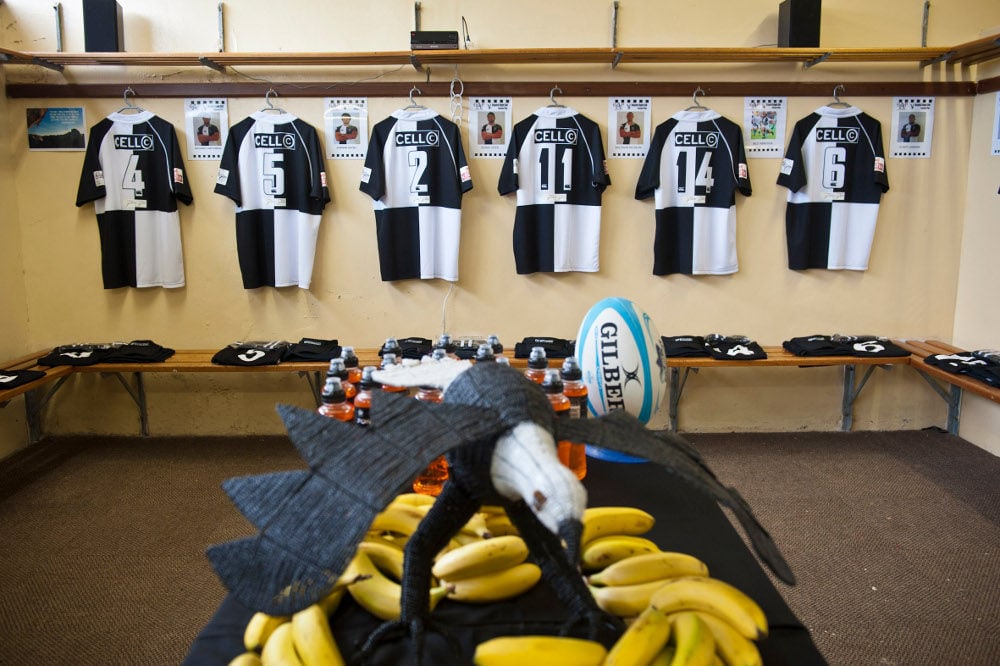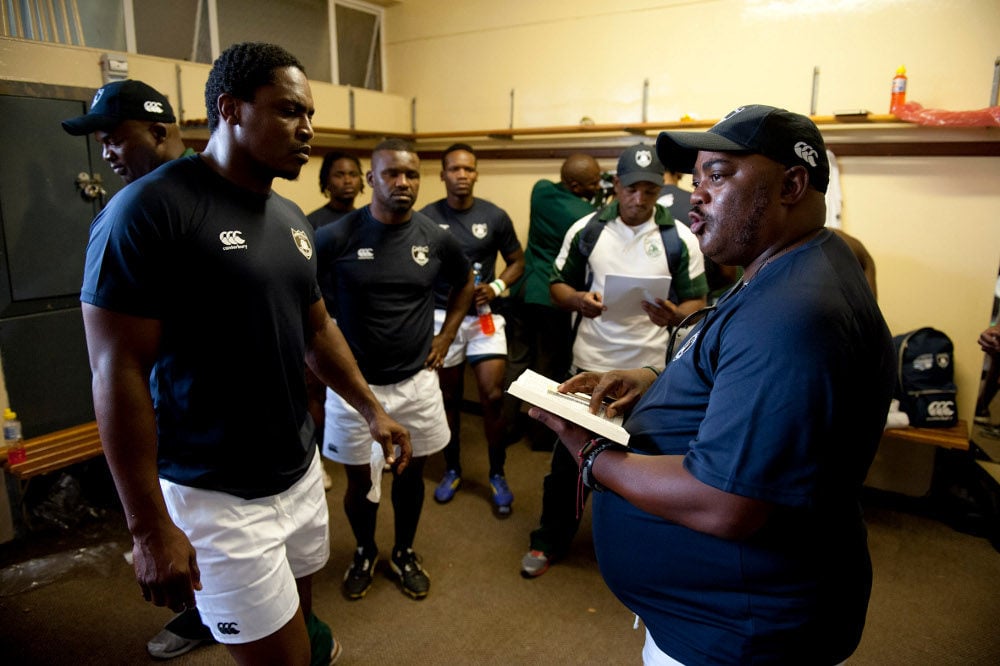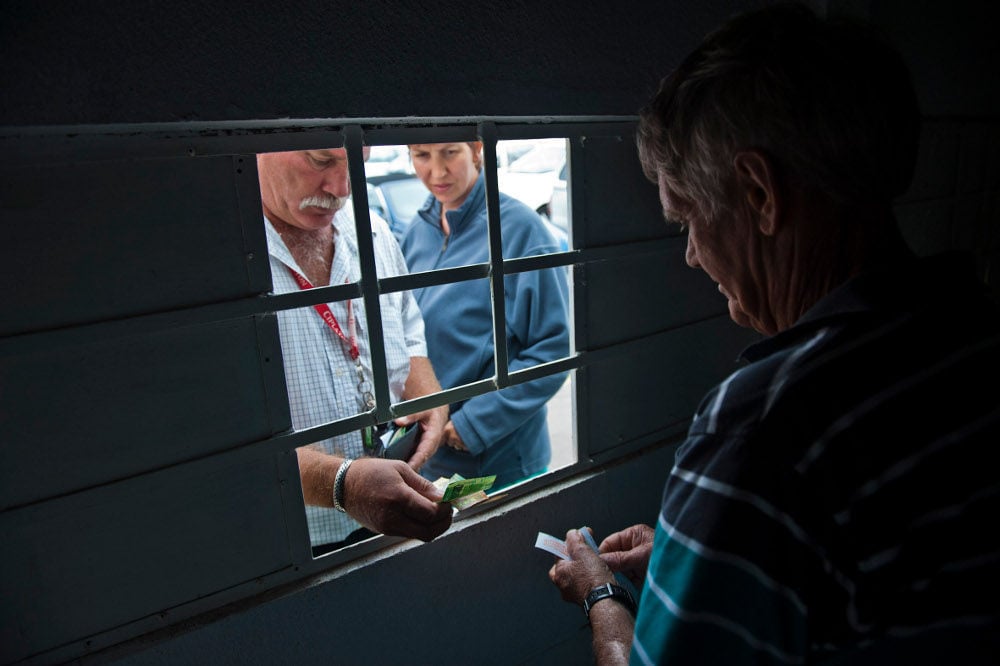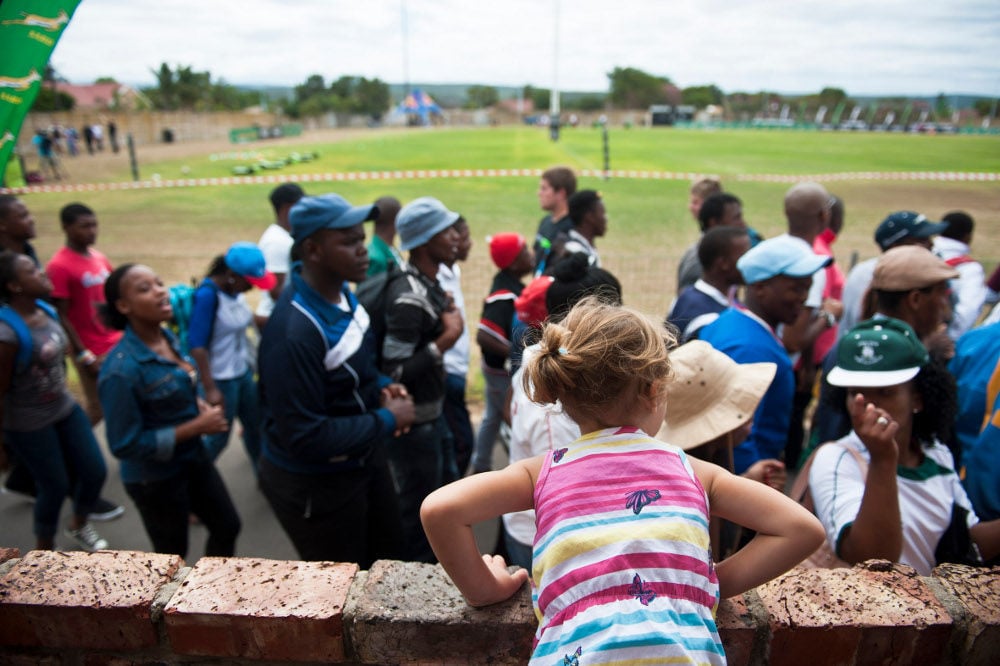Spring Rose versus Despatch.
On the night before last Saturday's Community Cup rugby match against Despatch, Spring Rose's Luxolo Mpalala downloaded a video. Mpalala, brother of Spring Roses' coach, Lulama, was buying the team breakfast the following morning and needed a quick hit of inspiration.
He wanted to see Al Pacino do his thing in On Any Given Sunday; he wanted to see the weary American football coach, rolled newspaper in hand, move from the swamps of fatigue to his rousing crescendo, the inspirational speech in which he lays down a marker for his team by telling them that a game as furious as this might be needed to be won in inches – in increments of courage.
The following morning in Port Elizabeth (PE) was grimy with cloud, a stiff easterly wind buffeting the flags outside the restaurant. Luxolo, having watched the video the night before, gave his speech to the boys of Spring Rose at a Summerstrand restaurant. He didn't learn the Pacino speech by heart. Instead he tried to distil its essence.
He told them that they would need to show bravery beyond the ordinary. This, after all, was one of the more important games in the club's colourful 107-year history. To the 36-year-old fullback, Vincent Tstosobe, to "Killer" Mtaba, the ageing lock, to the boys from RDP houses with big eyes, he spoke of pride and composure, desire and courage.
He reminded them that, last season, in the local league, they had beaten Nelson Mandela Metropolitan University, or the Madibaz as they are nicknamed. And told them that on their day they could take on and beat any team in the world.
Fresh kit
At much the same time as Luxolo was giving his speech, so was Morne Koertzen laying out kit in the Despatch dressing-room. One of his duties as team manager is to see that every player has a fresh jersey, ironed shorts, pristine socks. He had taken the previous day off work as a quality controller at Schnellecke, the logistics service provider to the big Volkswagen plant in Uitenhage, so that he could arrange the home dressing room perfectly.
He photocopied homilies and words of inspiration from Winston Churchill and Louis L'Amour and stuck them to the walls. He found a beaded black-and-white eagle (the club's symbol) and placed it on a table in the centre of the room.
Around the eagle he placed a garland of bananas. When he was done he showed his handiwork to Oom Boet van Rensburg, who has been a Despatch supporter since 1945. As their oldest surviving fan, he was chosen by club management to lead the side out on Saturday afternoon. He had arrived by mid-morning and spent the empty hours either side of noon fitfully, like an excited little boy, pacing in front of the WJ de Wet's stadium's grandstand.

The carefully prepared dressing-room of Despatch
In the past three or four years Despatch had set about reclaiming their glory days. With the legendary Danie Gerber in the side, they won the National Club Championship in 1985 and 1988, beating Tukkies in both finals.
The next 20 years saw the club plunge into what many assumed was a terminal decline running parallel to that of the working-class town itself, but four years ago Willem Oliphant, a local entrepreneur and former Despatch boy, arrested the slide.
Work opportunities
He provided work opportunities for some first-5 players, subtly distanced the club from some of its more prickly and destructive former greats, and set about taking natural advantage of two of Uitenhage's best rugby-playing feeder schools in Daniel Pienaar and Brandwag.
Last year Despatch won the inaugural Community Cup, beating Durban's College Rovers in the final, having been trounced by them in the competition's opening round.
It was feared by some that their opening fixture this time around would be something of a mismatch. Spring Rose were a wild-card entry and there were fears the occasion might be overwhelming.
Unlike, say, Despatch – who have a former Super Rugby player in the shape of the Sharks' Monty Dumond in their starting line-up – Spring Rose don't have any familiar faces or household names. Indeed, they lost Zingisa April, a nifty flanker, to a club in George shortly before the start of the season because he was offered a work opportunity there.
They have recently lost three other players, largely because New Brighton, the township from which they come, doesn't have enough to keep them. In the match notes, several of their players' job descriptions are given as "kiosk manager" (it means they run spaza shops).
League of its own
Yet when it comes to history, Spring Rose is in a league of its own. Named after the blossoming of white spring roses in the area of Elaleni, a suburb of New Brighton, the club was nicknamed "Kavala" by old-timers because Kavala used to be a cheap township cigarette that came in a green-and-white packet – Spring Rose colours.
These old-timers tell you with pride that Roses produced some of the best black Springboks who ever pulled on a jersey. The legendary Winty Pandle was a Spring Rose, as were Cyril Twaku, Baba Jali and Makaya Jack.

Spring Rose coach Lulama Mphalala
The finest of all was probably the peerless Peter Mkata.
"He was by far the best flyhalf I have ever seen," says Gerald Majola, the former chief executive of Cricket South Africa and a long-time member of the club and one-time player.
As kick-off approaches, the old stadium fills up slowly. The rain stays away. Occasionally the sun peeps through the hurrying clouds. The pannekoek stall outside the ground does a middling trade.
Club history
A contingent of township high school pupils make for the top rows of the grandstand – and burst into song. Ria and Chris Delport and their friend Kenny Marchant sit down to watch the curtain-raisers. Well they remember when the club was in its pomp in the late 1980s.
"You had to park your car in the morning to get space," says Ria matter-of-factly. She estimates that home games for Despatch, with legendary province meanies such as Adri Geldenhuys, Pote Human and Frans Erasmus in their ranks, used to attract home crowds of between 7 000 and 10 000 spectators.
Today's gate will be closer to 2 000, with adults being charged R10 and students and children R5. The gate and bar profits will be kept by the home club. Spring Rose has been awarded home ties later in the competition but today it is Despatch's turn. They expect to make about R30 000.
When Geldenhuys and Gerber were cutting a swath through club rugby in the 1980s, the town was healthier than it is today. Despatch found itself in a busy industrial corridor stretching from PE harbour, up through its tyre factories toward Despatch and ultimately Uitenhage, Despatch's sister town.
Drawing its townsfolk from Afrikaner blue-collar workers, it is fair to say that the town was never at the cutting edge of political enlightenment. Indeed, it had a reputation for being something of an Afrikaner Weerstandsbeweging stronghold.

About 2 000 tickets were expected to be sold for the match between Spring Rose and Despatch
Nowadays, racial politics have appeared to settle down into something approaching tolerance, although it is quite possible that tolerance is being confused with thinly disguised suspicion. Still, there is progress of sorts. At tighthead in the Despatch front row, Ace Nogampula packs down with his hooker Bobby Dyer; the loosehead duties are handled by Dyllan Lamprecht – it's a fully transformed front three.
Eventually to kickoff. Despatch play with the wind in the first half. Their nerves are clearly visible, their flyhalf Dumond missing an early penalty before steadying home nerves with three handy points. Soon after comes their first try, which arrives after a piece of dogged opportunism from their centre Jaco Bekker, who outsprints the strangely lacklustre Roses fullback to pounce; Dumond converts and adds another penalty as Despatch march to a 13-0 half-time lead, their early nerves now transferred to Spring Rose, who play in a kind of highly agitated panic.
Perhaps this has something to do with many making their television debuts (the match being shown live on SuperSport 1). But maybe it has something to do with a slightly whistle-happy referee, who seems wilfully intent on imposing his pedantry on the game.
After the break, Spring Rose come out with greater intent. They are playing with the wind now and, suddenly – with their flyhalf Thulani Meki succeeding with a penalty – the 10 points they trail by doesn't seem that much.
Then some luck. Despatch have Nogampula and Bekker yellow-carded in quick succession. With the home side down to 13 men, Spring Rose sniff an opportunity.
Best rugby
They play their best rugby of the match, a try-scoring opportunity in the far corner of the field being snuffed out before, achingly, they nearly plunge over under the posts – only for their drive to be repulsed. Despite a second penalty to Meki, the sin-binned Despatch players return, as their winger Billy Mentoor runs in a second try and Despatch run out deserved 24-6 winners.
None of this would have been possible without the vision and energy of SA Rugby's Duane Heath, an evangelist for club rugby who played rugby at the University of Cape Town and later – after chasing a girlfriend to Sweden – found himself at flyhalf for Hammarby in Stockholm.
His time in Scandinavia was enlightening: it taught him about the deep pride – the unalloyed joy – that club rugby gives its players.

Match day
But on his return to South Africa about 10 years ago, he realised that club rugby is the family's poor relative, the slightly shabby distant cousin who, on cue, will make a spectacular gaffe at the sport's high table. He sought a way to remedy this and so the Community Cup was born in 2013.
The format of the competition sees four groups of five provincial champions (plus several wild cards and excluding all university rugby teams) battle it out before the top two from each group play-off in the quarterfinals.
Sneaky qualifier hopes
Heath points out hopefully that, despite their loss to Despatch, Spring Rose still have a theoretical possibility of qualifying for the knockout stages. Two of their next three matches are at home and they might just sneak through as their group's second-placed side.
The tireless Heath is an interesting case because he spends time stiffening the high-rise of his romance with the girders of reality. On the one hand he tells me that "fairy tales are few and far between in this type of rugby" but on the other he is visibly moved when he tells the story of Roses of Wellington flying up to Johannesburg for an away tie in last year's competition.
He accompanied them on the flight and found himself being asked by a Roses player who had never flown before whether the turkey and cheese sandwich being handed out by the air hostess was for free. Later, he discovered Roses players – who are mainly young, working-class and unemployed – taking cellphone photos of their omelettes at breakfast the following morning.
"It's not important that these guys get a provincial contract," says Heath. "It's more important that they get their moment in the sun."
An administrator who is instinctively uncomfortable in the limelight, Heath has got it almost spot-on in the format and logistical underpinning of the tournament.
His masterstroke – given that this is an amateur tournament and that none of the 20 participating clubs can have a provincially contracted player – is that the winners receive a cup, but no prize money.
A smart move: keeping the Community Cup's amateur ethos alive, and suggesting there is more to sport than signing-on fees and inflated wage packets for young men who can barely sign their names at the bottom of their contracts.
For more on Eastern Cape club rugby go to mg.co.za/despatchrugby.